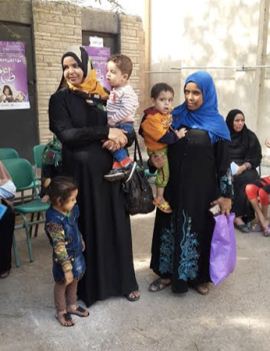 Immunization is an important tool in preventing diseases such as diphtheria, tetanus, whooping cough, measles and polio in Egypt.The Expanded Programme of Immunization (EPI) is a priority programme for Egypt due to its cost effective ability to save lives. EPI in Egypt has achieved several successes in controlling vaccine preventable diseases, including strong national vaccination coverage of over 90%, through an increase of vaccine coverage and continuous surveillance leading to reduced illness, disability and death from diseases such as diphtheria, tetanus, whooping cough, measles and polio.
Immunization is an important tool in preventing diseases such as diphtheria, tetanus, whooping cough, measles and polio in Egypt.The Expanded Programme of Immunization (EPI) is a priority programme for Egypt due to its cost effective ability to save lives. EPI in Egypt has achieved several successes in controlling vaccine preventable diseases, including strong national vaccination coverage of over 90%, through an increase of vaccine coverage and continuous surveillance leading to reduced illness, disability and death from diseases such as diphtheria, tetanus, whooping cough, measles and polio.
The Ministry of Health and Population (MoHP) continues to advance its EPI efforts through the introduction of haemophilus influenza (Hib) vaccine as a component of PENTA vaccine, aiming at reducing morbidity and mortality due to bacterial pneumonia. In addition to this, the MoHP is introducing a pilot programme for birth dose of hepatitis B vaccine as a part of its plan of action to address viral hepatitis.
With high coverage rates for routine immunization, vaccine-preventable diseases have shown a remarkable decline in past decades. However, several factors indicate that there are still challenges, with measles outbreaks occurring in 2013 and 2014, and an increasing need for funding for new vaccine introduction.
In line with the Global Vaccine Action Plan 2010–2020, WHO continues to support Egypt’s efforts in EPI through the training of vaccinators and supervisors in surveillance and routine immunization.
WHO provides direct support MoHP in the procurement of cold chain equipment, including fridge freezer and log tags. WHO also provides technical support with the introduction of IPV and financial assistance in maintaining acute flaccid paralysis surveillance.
Towards polio eradication
Egypt has been polio free since 2006 and immunization and surveillance activities are critical to maintaining its polio-free status. Wild poliovirus importations were found through environmental sampling in December 2012 and February 2014, and outbreaks within Syria pose a risk for further importation.
Since Egypt was declared polio free two national immunization days (NIDs) have been conducted each year by the MoHP with support from WHO, UNICEF and USAID. Technical support is provided by WHO through training in campaign roll-out, surveillance and communications.
WHO also provides independent NID campaign monitoring. The April 2014 report revealed a high overall coverage (97%), but also found certain hotspots where coverage was below 90%. The findings from the campaign monitoring report have since been used to target these areas in the October 2014 NID.
Related links








